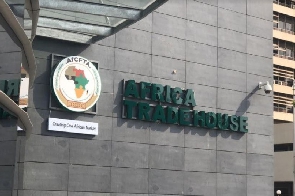The ports of Ghana remain one of the avenues of revenue generation for the government. Revenues are mobilised from the trade transactions that occur at the ports and the territorial borders of the country, mostly in the form of payment of levies, fees and taxes charged on goods and services.
The government priority to make firms more competitive and advanced in technology to meet the flipflop global demands of goods and services necessitated the commitment of investing considerably into ports infrastructure in Ghana. This development has made it possible to culminate into the gains of resource growth at the ports, tailored towards achieving the principles of trade facilitation.
Interestingly, the port is well endowed with numerous opportunities that is continually tapped by players of the sector which includes but not limited to; freight forwarders, exporters and importers, shipping lines, customs etc. thus contributing to job creation, increased global value chain and development at the ports.
The second quarter of 2020 saw the global economy experiencing the COVID-19 pandemic, which sparred and altered the foundations of economies, creating discomfort to humans amid health crises, shut-down of business activities and job losses, and seizing international trade with a fear of rise of trade protectionism. In light of the global economic development, the government of Ghana revised its 2020 year GDP growth from 6.8 percent to 0.9 percent. Which also saw the revision of the government fiscal policies leading to the provision of tax reliefs and incentives, and financial support to businesses and firms within the country.
Industry Players
Players like the freight forwarders, shipping lines, customs and many others have contributed significantly to ports activities over the years. Making their relevance at the ports unprecedented due to the unrelenting support and contribution made towards the country’s trade growth. Freight forwarders mostly act as agents for both exporters and importers tasked with the function of serving as intermediaries between shippers and carriers of goods either by sea, air, road or rail.
They also help in facilitating international trade across borders with a core mandate of ensuring an efficient usage of customs procedures. Their activities at the port is expected to promote an increase in the global value chain across the frontiers and landlocked countries.
Exporters and importers play a systemic role in increasing the GDP growth of the country through the exchange of goods and services. They are strong determinants of economic growth, bearing in mind the benefits associated with the export and import activities which includes foreign exchange, reduction in trade balance, increase in the welfare of the people, revenue mobilisation derived from indirect taxes and fees levied on imported goods.
Customs is one of the well recognised drivers of revenue growth of the country. It is worth commending the good work done by the World Customs Organisation through the support of the Kyoto Convention and under the guidance of the World Trade Organisation, for the tremendous reforms made to customs administrations over the years particularly in Ghana.
Through the implementation of policies and programmes over the period, certain customs practices have evolved in response to the globalization of manufacturing, just-in-time production processes, and the growth in e-commerce.
Over a hundred shipping lines and charters operating within the corridors of the country helping to facilitate and secure international trade of transport of containerized goods and vehicles contributing significantly to export and import growth, boosting ports infrastructure and creating employment for the people of Ghana.
We cannot imagine the effect the pandemic caused considering the benefits that the country derives from these industry players. Port activities and customs-oriented procedures were severely affected as a result of the pandemic.
Additionally, there was significant reduction in physical interactions between port operators (i.e. freight forwarders, customs, shipping lines etc.) at the ports creating a delay in shipment clearance, an inspection of containers and breakdown in exchange of customs information. This unbearable situation created some sort of discrimination and favouritism on the parts of customs to agents and shipping lines.
In order to have the effect of the pandemic under control, the government provided some financial and tax incentives to producers and manufacturers, businesses and firms in Ghana under the CARES programme. Which is expected to sustain and continually make them more competitive in international trade.
Policy Perspectives
The unfolding effect of COVID-19 pandemic on economies of the world has left nations to experience sharp downturn in trade flows, large fiscal deficit, rise in unemployment and inequality, deficit in balance-of-payment amid the ban on freight impacting negatively on the global value chain of products, particularly under international trade. Such an unbearable situation made nations of the world to put-in policy measures to curtail the effect of the pandemic.
Which witnessed the advice and significant support from the World Trade Organisation and Bretton Woods institutions - the International Monetary Fund (IMF) and World Bank, to countries in areas of monetary easing, fiscal stimulus, structural adjustment and trade policy measures to tackle the covid-19 pandemic.
Ghana, like any other countries, benefited substantially from these support. The World Bank provided an amount of US$100 million to the government in addition to the support received from the private sector. Out of this, the government provided relief support to COVID-19 patients, businesses, the unemployed and certain sectors of the economy that were severely affected.
As countries begin to get their share of the second wave of the pandemic, it is in the best interest to alert the government and the relevant stakeholders on the need to review and implement new adjusted policy programmes. This would help control the effect of the second wave on trading activities at the various ports and borders of the country.
It is important that the government take a closer look at the facilities at the port, particularly those used by the freight forwarders and ensure the adherence of the covid-19 health protocols to avoid future disruptions at the ports. The government must also ensure the provision of frequent COVID-19 health screening for drivers of transit goods and freight forwarders, provide clean washroom facilities, good rest-rooms, and continued disinfection of the environment.
The introduction of welfare policies will help provide financial and social support to freight forwarders as the second wave is largely expected to affect their activities, and would go a long way to cushion them against the imposition of lockdown restrictions by trading partners across the globe.
As such special incentives should be given to freight forwarders who will have their consignments placed under customs procedures, thus transit and transhipment, warehousing, internal consumption, outward and inward processing of goods as means to cushion their losses over the short-to-medium term of the crisis.
On the side of exporters and importers, it is important that the government put-in some financial and fiscal measures that will help sustain their economic activities over the long-term.
As such, the government must take into consideration the revision of some port charges, levies and taxes to relieve exporters and importers from the hardships borne out of the pandemic.
In addressing the disruptions, chaos, breakdown in technology and global value chain, demurrage, and delays caused at the ports during the COVID-19 pandemic, it is important that customs be made to provide exceptional trade facilitation measures for legitimate trade in order to keep seamless flows of goods, and allow companies to run their businesses to the greatest possible extent.
The single window platform should be made available and accessible at any given time devoid of network constraints. Customs must be empowered by their law (Customs Act, 2015) to waive certain charges in this time of COVID-19, as a measure to keep businesses afloat.
The privately established Integrated Customs Management Systems (ICUMS) aimed to support the revenue mobilisation by customs, should be streamlined to consolidate the gains of the paperless system of doing business at the ports. It will also serve as a measure to deal with the rising discrimination and favoritism of doing business at the ports, particularly on the part of the customs.
There is the need for advancement in technological systems at the ports, to enable customs, shipping lines and port operators work from their respective homes and offices without physically being present in the event of a second wave. There should also be the installation of modern non-intrusive inspection equipment for scanning containers to avoid undue delays in clearing goods at the ports under this unusual time of the world. These measures should help increase efficient ports delivery services and ensure effective customs administration to combat illegal trade at the ports.
Some laws that strictly encourage customs-agents interactions at the ports require amendments.
These include custom valuation processes, temporary admission processes, classification verification, container inspections, forms submission and payment processes etc. Finally, the coming into force of the African Continental Free Trade Area (AFCFTA) in January this year provides the government and relevant stakeholders the opportunity to adopt strategic measures to curtail the over a million goods to be traded across the borders of Ghana. As such, the Harmonized Commodity Description and Coding System must be streamlined to contain the non-classified and un-coded goods that will be traded across the various ports and borders of the country.
There must be an enhanced regulatory system for full compliance of Article 6 of Part I of the AFCFTA treaty.
Since the single market to be created is expected to promote regional trade and investment integration, encourage export diversification as well as promote industrialisation among member states. In view of the evolving economic trade development coupled with the effects of the COVID-19 on port activities, the government should shift from long to short-term fiscal policies as a measure to deal with the influx of goods that would flow in/out of the country. This should be done alongside the implementation of good structural policies such as the policy of industrialisation, expansion of port infrastructure, enhancement of technology, investment and financial risk assessment tailored towards achieving the improvement in the growth and development of the country.
There is the need for the execution of strategic quantitative easing measures to avert the escalation of certain macroeconomic indicators (inflation, exchange rate, interest rate) in the short-term.
Which can serve as an effective way of creating an advantage to Ghanaian exporters and importers as a way to mitigate their losses and create wealth under the African Free Trade. Further, as a matter of urgency, the government should institute capacity building programmes for customs, freight forwarders and relevant stakeholders to equip them with the modern concept of doing business at the ports amid the integration of the new systems of trading across the African frontiers.
These policy guidelines should be well implemented alongside with adherence to covid-19 protocols of ensuring a healthy and safety environment conducive for doing business at the various ports of Ghana, and to help absorb the expected short-run effect of the implementation of the African Continental Free Trade on the economy.
Investments Strategies for the Ports
“Past performance is not a guide to future returns”, investment literature holds and reminds policy makers of the need to harness good policies and strategies into the future as COVID-19 continues to strike nations. The times of global disruption requires a re-think and bold decisions to invest in areas such as ports to propel the economy for the future.
Regardless of time, investments remain constant and therefore a proactive approach to our ports with the AFCFTA coming into effect will help create investment opportunities for the country. Thus, having in mind that a bet against human’s ability to survive, change, adapt, co-operate and flourish is a bet against the world economies.
The complexity of ports investments and decisions require a holistic approach and niche market understanding to drive returns. It is therefore imperative to look at the diversification road map in three prioritised dimensional areas - Technology, Niche economies and Sustainability. Since we are in a world where many leaders complicate their investment strategies and as such the beauty of wealth creation lies in its simplicity. There is no doubt of Ghana being an exception.
There is also the need to invest in technology and implement advanced innovations to help connect the entire architecture from seaside, port and landside to align with the industrialisation agenda of the government. The architecture business model of creating a synchronised ports system must not be limited to Intelligent Asset Development, Cross Function Platform Solutions, Collaborative Tools and Risk & Compliance systems etc. This development model would help put the country in a frontline strategic position above other states.
Digitization and automation of the ports system are needed to drive the port's supply chain. These investments remove the physical infrastructure and improve cyber security across the supply chain, thus helping to transform the entire port architecture from a simple logistic to a robust system.
Brexit has taught the UK to reconsider their infrastructure by decentralising their entire port network across multiple locations. Ghana must be in a position to re-develop new ports for the northern belt and increase delivery time and avoid complex situations by investing heavily in the infrastructure component of ports.
Further, Ghana must now begin to develop a niche market focused on specialised product lines/services. It will go a long way to satisfy both the domestic and international market and give the local industry a competitive advantage under the AFCFTA. Which would require the government of the need to increase our raw material base and envisage a well thought plan in place to help navigate the future of the Ghanaian economy. The global changing of the demand of the energy markets as well as other commodity markets are indicative of a strategy that has come to stay.
Sustainability cannot be downplayed as this has become a prime component in keeping investments growth high for a country. The government must continue to anchor fiscal policies consistently for port infrastructure, service providers and help improve economic efficiency towards sustaining businesses and increasing employment. There must be a level of cooperation, collaboration and regulatory alignment to ensure transparency and encourage competition within the African free trade enclave.
Let’s not allow AFCFTA to be a monumental tourist site in the country but rather an investment partner for Ghana, Africa and the World. ‘’It takes a skilled and experienced eye to sort wheat from the chaff’’ by Richard Troue.
Thus, the Minister responsible for Trade and Industry should endeavour to allow the country to thrive “like never before’’ under the African Continental Free Trade Agreement.
Business News of Wednesday, 6 January 2021
Source: Atta Takyi & Samuel Okyere Donkor













